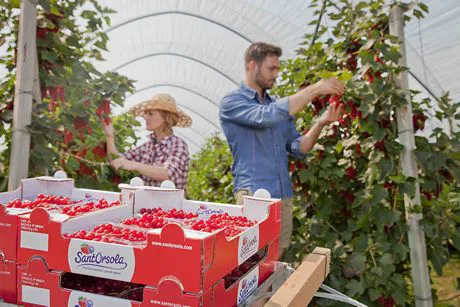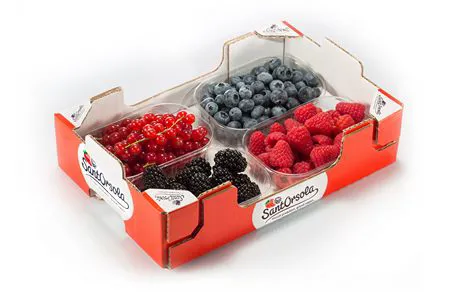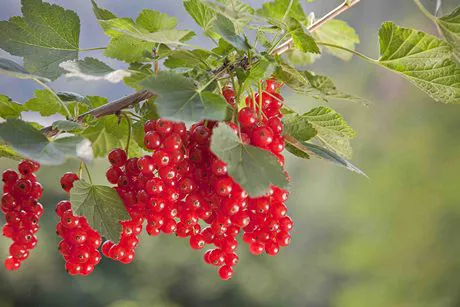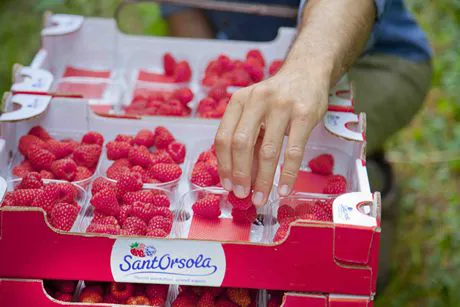
We talked about it with Matteo Bortolini, director of Società Cooperativa Agricola Sant'Orsola, while he visited a few associates in the Ragusa area. Sicilian crops have been playing a leading role in this sector for the past few years and represent the last step for Sant'Orsola, who 40 years ago started producing strawberries and soft fruit in Trentino. It is now one of the leading producers with a turnover of €56 million.
FreshPlaza (FP): Mr. Bortolini, why did Sant'Orsola choose Sicily?
Matteo Bortolini (MB): We were born in Trentino in the early 1970s: we started with strawberries and then introduced blueberries, raspberries, currants, blackberries, gooseberries and cherries. They are all available between May and October except for cherries, which are harvested between 20th June and 20th July. Consumption has increased over time and is now non-seasonal so, to meet demands, we looked for other production areas. We started with Calabria, then there was Veneto and we included Sicily seven years ago. We also have display crops on the island, so growers can understand what it means to grow small fruit."

FP: How many members are there in Sicily and how many hectares? Which are the varieties cultivated?
MB: Sant'Orsola counts 880 members all over Italy, 40 of which are located in Sicily and they grow raspberries (Lagorai Plus and Vajolet varieties) 12 months a year. Crops cover 30 hectares and 426 in total all over Italy.
FP: When does harvesting start and is there a delay compared to last year? Could you make a projection for the next 5 years?
MB: The first production in Sicily was in 2016, when 130 tons of raspberries were produced. This year, we are expecting 300 tons, though there is a 15 day delay due to the bad weather. The objective for the next 5 years is to double the production and reach a total volume of 9,000 tons.

FP: How does logistics work?
MB: The entire domestic production is collected by our facility in Pergine Valsugana (TN), where it is packaged after checking it meets our strict standards. The cold chain is maintained during the entire post-harvesting phase. We ask our partners to deliver the produce to their local centre twice a day.
FP: Are the varieties cultivated in Sicily different than those in the other regions and is there any news regarding the varieties?
MB: The Cooperative requires members to grow certain varieties chosen according to criteria like colour, appearance and organoleptic qualities. Our experimentation centres are studying new varieties, but there is nothing new to report at the moment.

FP: What does soft fruit need in terms of labour, irrigation, nutrition etc.?
MB: Raspberries are very hard to grow and cultivation cannot be improvised, while it is slightly easier to grow blueberries. The quality standards we require are very high, as we expect a growth in both quantity and quality. We do not accept a simple growth in volume!
FP: Protected crops and soil-less cultivation. Why is this?
MB: To protect fruit from the elements and therefore reduce the need for treatments focusing on natural antagonists and useful insects. Soil-less cultivation is instead a technique we implemented in the 1990s in limited areas.
FP: How much produce is destined to the processing industry and how much to the fresh produce market?
MB: Our entire production goes to the fresh produce market, however, in case of specific weather conditions, we might freeze some of the produce.
FP: We often talked about the enthusiasm for this fruit, but what are the production costs and the profits per hectare? Which are your main markets?
MB: The initial investment is rather high. Our objective is to maximise the results for our members, though commitment and effort are required for a positive result. We work mostly on the domestic market, while 10% of the produce is shipped abroad to Germany, Austria, Switzerland, Spain and the UK.
 For further information:
For further information:Sant'Orsola Soc. Coop. Agricola
Sara Bellini
Via Lagorai 131
38057 Pergine Valsugana (TN)
Tel.: (+39) 0461 518170
Cell.: 335 5642361
Email: sara.bellini@santorsola.com
Web: www.santorsola.com
Facebook: www.facebook.com/CoopSantOrsola
